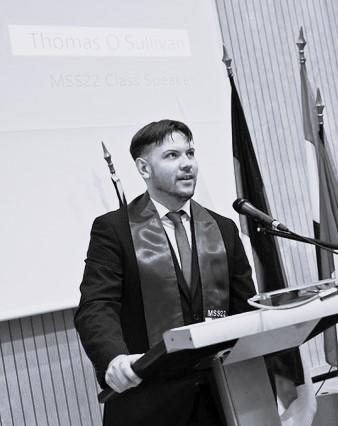Thomas O'Sullivan

PhD Student | Quantum Chemistry for Impact Ionisation Mass Spectrometry
Room D218a
12249 Berlin
My background is in astrophysics, having completed my BSc. at the University of Kent in the UK. I hold an MSc. in Space Studies from the International Space University in France, where I specialised in the hydrothermal synthesis of organic compounds on icy ocean-bearing moons in the outer solar system.
My PhD project aims to model impact ionisation mass spectrometry and its laboratory analogue, laser-induced liquid beam ion desorption (LILBID), using a quantum chemistry-based computational approach.
Many of the icy moons in the outer solar system are considered increasingly important targets in the search for life beyond Earth, given the presence of liquid water on many of them. In particular, Enceladus, a geologically active moon of Saturn, and Europa, a similar but larger moon of Jupiter, have been well-studied by space missions in recent decades and have been revealed to host substantial global oceans of liquid water. Enceladus ejects ice grains originating from its subsurface ocean through fractures in the south polar terrain, in the form of a plume, whilst grains are sputtered from the surface of Europa and may also be ejected through potential plumes. Enceladus was investigated extensively by the joint ESA/NASA Cassini-Huygens mission between 2004 and 2017, with compositional analysis of the subsurface ocean conducted by its mass spectrometers. The Cosmic Dust Analyzer (CDA) and the Ion and Neutral Mass Spectrometer (INMS) sampled material ejected through the plume, revealing a diverse inventory of organic and inorganic chemical species. The organic components of Enceladean ice grains are of biological interest and could be related to potential prebiotic or biogenic chemistry. This project aims to theoretically constrain the mass spectral appearance of relevant organic compounds to assist with further characterisation of Cassini data and to guide planning for future missions to icy moons. Based on the expertise of the project’s co-supervisor, Dr. Partha Pratim Bera (NASA Ames Research Centre), the project will apply contemporary computational techniques based on quantum chemistry to predict and analyse mass spectra of organic-containing ice grains. Quantum chemical (QC) methods have been applied to some types of mass spectrometry (e.g. electron ionisation – as utilised by INMS), although scarcely to impact ionisation (as CDA utilised) or its laboratory analogue for ice grains, laser-induced liquid beam ion desorption (LILBID). Within this project, QC methods will be applied to both EI and LILBID to assist in the complementary analysis of mass spectra generated through each. Furthermore, QC techniques will complement existing interpretations of data by identifying the most favourable fragmentation pathways, constraining current insights into the composition of organics from the Enceladus subsurface ocean. This project is funded by an Elsa-Neumann Scholarship
Research interests
- Cosmic dust and ice grains
- Icy moons
- Astrobiology
- Planetary habitability
- Hydrothermal systems
- Mass spectrometry
» Detailed publications and conference contribution available on Google Scholar.
Publications and conferences:
2024
Khawaja, N.*, Hortal Sánchez, L.*, O’Sullivan, T. R.*, Bloema, J., Napoleoni, M., Hillier, J., Klenner, F., Beinlich, A., John, T., Postberg, F., 2024. Laboratory Characterisation of Hydrothermally Processed Oligopeptides in Ice Grains Emitted by Enceladus and Europa. Philosophical Transactions of the Royal Society A, 382(2273), 20230201. doi.org/10.1098/rsta.2023.0201 *contributed equally.
Khawaja, N., O’Sullivan, T.R., Hortal Sänchez, L., Bloema, J., Napoleoni, M., et al., 2024. Mass Spectral Properties of Hydrothermally Processed Triglycine (GGG) in Ice Grains Emitted by Enceladus and Europa In: EGU General Assembly, 14 - 19 Apr 2024; Vienna, Austria.
2023
Khawaja, N., O’Sullivan, T. R., Klenner, F., Hortal Sánchez, L., Hillier J., 2023. Discriminating Aromatic Parent Compounds and their Derivative Isomers in Ice Grains from Enceladus and Europa using a Laboratory Analogue for Spaceborne Mass Spectrometers. Earth and Space Science, 10(4). doi.org/10.1029/2022EA002807
O’Sullivan, T. R., Khawaja, N., Klenner, F., Hortal Sánchez, L., Hillier J., 2023. Discriminating structurally similar organic molecules in ice grains using an analogue experiment for impact ionization mass spectrometry. In Dusty Visions Workshop, 24 - 26 May 2023; Freie Universität Berlin, Berlin, Germany.
Hortal Sánchez, L., Khawaja, N., O’Sullivan, T.R., Bloema, J., Napoleoni, M., et al., 2023. Laboratory Investigation of Hydrothermally Processed Triglycine: Implications for Organic Enriched Enceladean Ice Grains. In: EPSC-DPS Abstracts, 1 - 6 Oct 2023; San Antonio, TX, USA.
Khawaja, N., Hortal Sánchez, L., O’Sullivan, T. R., Bloema, J., Klenner. F., Hillier, J., Postberg, F., 2023. Organic Inventory of Enceladus Subsurface Ocean: Implications of Hydrothermal Processing in the Laboratory. In: Dusty Visions Workshop, 24 - 26 May 2023; Freie Universität Berlin, Berlin, Germany.
Khawaja, N., Hillier, J., Klenner, F., O’Sullivan, T.R., Postberg, F., 2023. Complementary Mass Spectral Analysis for the Identification of Organic Compounds in Ice and Dust Grains. In: PERC International Symposium on Dust and Parent Bodies, 27 Feb - 1 Mar 2023; Tokyo, Japan.